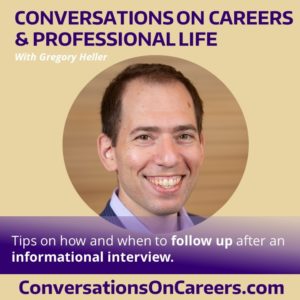 Have you ever wondered when you should follow up with someone who’s give you an informational interview? I’ll share three tips in under six minutes to answer this common job seeker question.
Have you ever wondered when you should follow up with someone who’s give you an informational interview? I’ll share three tips in under six minutes to answer this common job seeker question.
A big part of the internship and job search strategy for MBA candidates is conducting informational interviews with people working in the roles and industries that candidate is seeking a job in. We sometimes call these “coffee chats” or “prototyping interviews” in the language of Designing Your Life. These types of conversations are a big part of the 2-Hour Job Search Strategy outlined in the book of the same name by Steve Dalton. You can hear my conversation with him on season 4, episode 3, find it at Conversations on Careers dot com, where you’ll find conversations with my colleagues Elaine Newtson and Stacy Duhon about informational interviews.
One question I often hear from students is some form of: How and when should I reach back out to people I’ve talked to for informational interviews?
There is one important thing to remember about informational interviews, and Asal Mirsalimi shared this on Season 2 Episode 6: you are not going to become new best friends with every person you have one of these conversations with. There are some people who you just won’t click with at all. Maybe they are what Dalton calls an “obligate” someone who felt obligated to meet with you because of your mutual connection, or maybe it was just an off day for one or both of you. These conversations are about gathering information, and building your network, and not every one of them will achieve both goals.
It should go without saying that after you’ve had one of these conversations, you should promptly follow up with a thank you email. This person gave you some of their time, hopefully they gave you some valuable information and insights, but even if you don’t feel like it was productive, you need to thank them for their time.
But after that initial thank you, what should the cadence of contact be? This is partly dependent on your phase in the job search. This is why I’m reluctant to provide any hard and fast rule about cadence. But here are three ideas for when it is a good opportunity to reach back out, and if one of these happens to within 4 to 6 weeks of the first meeting, great. If you want to kindle an ongoing relationship, I would probably aim for something like a quarterly or bi-monthly touch point. Unless you have already established a relationship, anything beyond 6 to 8 months is not likely to be super effective.
The first opportunity to reach back out is If they gave you a recommendation or advice that you have followed up on. For example a book to read, or a class to take, or a podcast episode to listen to. Reach back out and let them know you have followed through and found the recommendation or advice useful.
A second opportunity is If you have decided to apply for a role at their company, or a company you discussed with them, reach back out to let them know and tell them how helpful the conversation was in preparing your application, or making your decision. This is an opportunity to turn them into an internal advocate. They may even get a referral bonus if you are hired. In this instance, you might include a line like, “Would you be available for another conversation if I get selected to interview?” This follows the concept of commitment and consistency outlined in Robert Cialdini’s book influence. Getting someone to commit in advance will make them more likely to follow through later. If this “event” comes after you’ve had multiple interactions with the person, you may have already discussed getting a referral. But you shouldn’t ask for a referral if you’ve just met with someone once and exchanged an email or two.
The final opportunity to reach out that I’ll mention is If you’ve encountered some piece of information that you think would be interesting to them, for example an article, podcast, book, or case discussion from a class that is relevant to the conversation you had with them in some way. You might have attended a conference, or be planning to attend a conference relevant to their work or industry. In these cases reach out with a short note and a link to let them know.
In each of these cases, and just about all emails you send during the job search or career exploration process keep the message concise, aim for about 100 words as my guest Kristin Graham suggested in season 4 episode 6, make sure that your writing is professional and error free, and use a good clear subject line. For more tips on improving your writing, check out this LinkedIn Learning class from Grammar Girl.
You might also be interested in the Grammarly App and Hemmingway App, which both can help you write more clearly and concisely.
